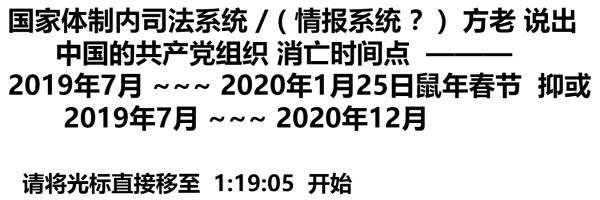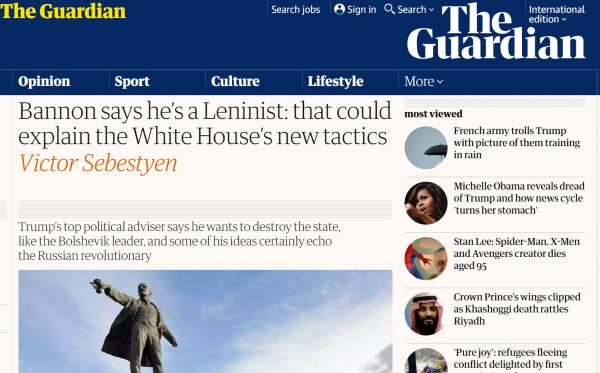










Stephen Bannon, President Trump’s chief political strategist and, after Trump, the most powerful man in Washington, once declared proudly: “I am a Leninist.” He was talking to a New York university academic who had written extensively on communism and the former Soviet Union. “What on earth do you mean?” the professor asked him. “Lenin wanted to destroy the state and that’s my goal too,” replied Bannon. “I want to bring everything crashing down and destroy all of today’s establishment.” From the evidence of Trump’s extraordinary campaign and first two weeks in the White House, Bannon has an assortment of Leninist political tactics that could have come from the Bolshevik leader’s playbook. Two days after Lenin seized power in Russia almost exactly a century ago, he began an assault on the press – and his successors in the USSR did not let up for the next 70 years. In the few months between the overthrow of the tsar and Lenin taking power, a relatively free press had sprung up, almost all of it vigorously opposed to Lenin, who was written off as a dangerous demagogue. When his Bolshevik party mounted a successful coup and Lenin made himself, in effect, dictator of Russia, one of his first acts was to censor the press, which he called “a weapon no less dangerous than bombs or guns aimed at us … Why should we place it in our enemies’ hands?” Three days after Donald Trump’s inauguration Bannon told the New York Times: “The media should be embarrassed and humiliated and keep its mouth shut and just listen … I want you to quote this. The media here is the opposition party. They do not understand this country.” Kellyanne Conway’s “alternative facts” are not entirely different from the “objective truth … the greater truth” that Lenin used to call for in the USSR’s state-run newspapers. If Twitter had been around then, he would very likely have used it. Lenin was brilliant at producing a pithy phrase to explain a complex problem so that anybody could understand. No one should directly compare Lenin’s seizure of power in a military coup in 1917 with the populist insurgency that has swept through America and elsewhere in the west through the democratic process. And the lies the communists told for decades are different from Bannon’s or Trump’s. But much of Lenin’s political style and strategy can be adapted to present conditions. He depended on constant conflict and drama. He deliberately used shock tactics. He was nearly always domineering, abusive and combative, and often downright vicious. He battered opponents into submission with the deliberate use of violent language, not because he was personally vicious – he wasn’t – but as a technique “calculated to evoke hatred, aversion, contempt … not to convince, not to correct the mistakes of the opponent but to destroy him, to wipe him and his organisation off the face of the earth”.
Breitbart, the website Bannon created, and the hate-filled language of alt-right politics, are decidedly Leninist in tone. Above all, Lenin needed to invent enemies he had to be seen to defeat. In post- revolutionary Russia it was the kulaks – richer farmers who were “sucking the blood” of poorer peasants, bankers who were war profiteering, the “elite” (a word Lenin used frequently) who treated the majority with contempt. He despised so-called “experts” who claimed a monopoly of knowledge. He often said that a worker with five days’ training could run a government department. He scapegoated opponents and labelled them “enemies of the people”. Lenin abolished the existing legal system and started afresh. Within a few weeks his regime closed down the first freely elected parliament in Russia’s history – and the Soviets never allowed another one. It would be wrong to assume that the next step for Trump is the abolition of Congress, or the construction of labour camps. But the unprecedented war by tweet between the administration and the judiciary over the president’s executive order on immigration has real echoes of Bannon’s revolutionary hero. Lenin would very likely have identified 2017 as a revolutionary moment. He matters today not because of his flawed and bloody answers, but because he was asking questions similar to those we are asking today. In his quest for power, Lenin promised people anything and everything. He offered simple solutions to complex issues. He lied unashamedly. He justified himself on the basis that winning meant everything; the ends justified the means. Lenin was the godfather of post-truth politics. Powerful people have learned depressing lessons from him. 谷歌译文:
特朗普总统的首席政治策略师斯蒂芬·班农(Stephen Bannon)是仅次于 总统、华盛顿最有权势的人物,班农曾经自豪地宣称:“我是列宁主Yi 者。”他正在与一位在共产主Yi和前苏联上撰写Guang泛文章的纽约大学 学者交谈。“你究竟是什厶意思?”教授问他。 “列宁要打碎国家机器, 这也是我的目标,”班农回答道。 “我想打碎 Sui 一切,摧毁今天所有 的体制。”
从特朗普的非凡竞选证Ju和白宫前两周的证Ju来看,班农有各种各Yang 的列宁主Yi政治策略可能来自布Er什维克领导人的剧本。
几乎一个世纪前,列宁在俄罗斯夺取政权两天后,他开始对新闻界进行 攻击 - 他在苏联的继任者在接下来的70年里没有放松。在推翻沙皇和 列宁掌权之间的几个月里,一个相对自由的媒体如雨后春笋般出现, 几乎所有的媒体都Qiang烈反对列宁,后者被视为一个危险的煽 Shan 动者。当他的布Er什维克政党发动了成功的政变并且列宁实际上是 俄罗斯的独裁者时,他的第一个行动之一是审查新闻界,他称之为 “一种不比针对我们的炸弹或枪支危险的武器......为什厶要这庚窗H 我们把它放在敌人的手中?“
唐纳德·特朗普就职典鬫Z三天,班农告诉纽约时报:“媒体应该感到 尴尬和羞辱,闭嘴,只听......我要你引用这个。这里的媒体是反对党。 他们不了解这个国家。“
Kellyanne Conway的“另类事实”与列宁过去在苏联国营报纸上所要求 的“客观事实......更大的事实”并没有完全不同。如果Twitter已经存在, 他很可能会使用它。列宁在制作一个简洁的短语来解释一个复杂的问题 以便任何人都能理解这一方面,非常出色。
没有人应该直接比较列宁在1917年的军事政变中夺取权力与通过民主 进程席卷美国和西方其他地方的民粹主憳q乱。共产党人几十年来所说 的谎言与班农或特朗普的谎言不同。但列宁的大部分政治风格和策略都 可以适应现状。他依靠不断的Chong突和戏剧。他特意使用了Chong击 战术。他几乎总是霸气,辱骂和好斗,而且往往是头尴恶毒。他 故意使用暴力语言来打击对手,不是因为他个人恶毒 - 他不是 - 而是 作为一种技巧“计算引起仇恨,厌恶,蔑视......不说服,不纠正错误对手, 但要摧毁他,将他和他的组织从地球上抹去“。
Breitbart,Bannon 创建的网站,以及充满仇恨的alt-right政治语言, Jue对是列宁主Yi的语气。最重要的是,列宁需要发明他必须被击败的 敌人。在革命后的俄罗斯,富农是富农,他们“榨取贫穷农民的血液”, 战争暴利的银行家,“精英”(列宁经常使用的一个词)以蔑视的方式 对待大多数人。他鄙视声称垄断知识的所谓“专家”。他经常说,经过 五天培训的工人可以管理一个政府部门。他把对手当作替罪羊并称他们 为“人民的敌人”。
列宁废除了现有的法律制度并重新开始。在几周之内,他的政权关闭了 俄罗斯历史上第一个自由选举产生的议会 - 苏联人从未允许另一个议会。 假设特朗普的下一步是废除国会或建立劳改营是错误的。但是,政府和 司法部门之间关于总统移民行政命令的推特前所未有的战争,已经成为 班农革命英雄的真正回响。
列宁很可能已将2017年确定为革命时刻。他今天很重要,不是因为他有 缺陷和血腥的答案,而是因为他提出了类似于我们今天要求的问题。在 他追求权力的过程中,列宁向人们承诺任何事情。他为复杂问题提供了 简单的解角霈蚰L毫不掩饰地撒谎。他在胜利意味Zhe一切的基础上为 自己辩护; 最终证明了手段的合理性。列宁是后真相政治的教父。有能力 的人从他身上学到了令人沮丧的教训。
|
